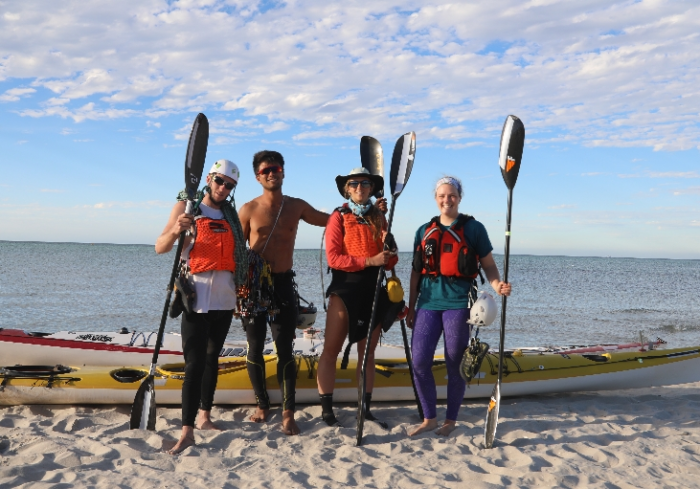Building Mental Toughness in an Unusual Training Strategy
In a few short days I will be embarking on a fairly intense training mission. But really, I’ve been building my physical and mental toughness for months up to this point.
A World First Expedition
In my summertime paradise of Seward, Alaska, I work with a bunch of stroke addicts. This last September a girl from town told me about an expedition she was helping to plan for the winter, and invited me on board. So here I am, in Melbourne, Australia.
Once our weather window opens up in a few days, Rachel and I, along with two Australians – Stanley and Josh – will be making our attempt at being the first to kayak and climb across the Bass Strait (from mainland Australia to Tasmania). The Bass Strait is a notorious stretch of ocean that gets crazy gnarly during storms and regularly engulfs ships. We will be spending about a month in the Bass Strait to explore rock climbing potential on some of the islands. Few people have been to this area to climb, and nobody has approached via kayak.
The Mental Challenge
The concept of spending three months with the same three people every single day is a little intimidating for me. I’m very good at being alone but also love having the option of being social. Not to mention I hadn’t even met the two Australian team members before I arrived in Australia almost a month ago.
It has been a whole new world trying to sync up with three people in order to achieve productivity while maintaining a fun environment and avoiding being mentally or emotionally drained. It pushes you to be your best self and to sort out your own personal flaws and mental blocks in order to be strong for the sake of the team. We need to be sturdy and cohesive to hope for success in our mission.
The mental growth isn’t limited to the social environment. The Bass Strait stretches 325 kilometers. Our longest day on the water will be around ten hours of continuous paddling through big ocean swell (in an ideal scenario). Keeping up the mental strength stroke after stroke will be a challenge in itself. There won’t be land in sight to distract us. We will paddle into the void for hours upon hours.
What I’ve learned so far is this: some days it feels like I’m suffocating, others it feels like I’m the happiest gal alive. One minute I’m getting choked with anxiousness to get out for a run or a paddle. And then we’re gathered around a dinner table filled with food and laughter, or we’re offered a ride in someone’s plane, on their sailboat or windsurfer. I feel so incredibly lucky and blessed with this beautiful opportunity. And yet, my introversion and mental focus is my biggest enemy. I’ve learned that self-care is of ultimate importance for sustained well-being. This being said, I’ve started to figure out my groove for balancing these things and keeping my focus strong. I’m ready for the Bass Strait.
Translation to the PCT
I think that a lot of what I learn on this expedition will be directly transferable to the PCT. On the trail I will have more flexibility in my balance of solitude and social interaction. This will be huge for me in my ability to sustain my drive and well-being. Feeling at home with oneself is a necessary precursor to feeling at home with others. But it can also get tricky when others start to know you more than yourself. Having an available support system on the trail is an important driving force for keeping morale high. There is no pushing through the tough times if you don’t have morale. And morale will fall flat if you don’t find a balance of how to charge your sunshine.
If you are interested in seeing more expedition updates, you are welcome to follow our team on instagram @straitupexpedition or my personal instagram @jamieetrapp . You can also peek at our website, straitupexpedition.weebly.com/
This website contains affiliate links, which means The Trek may receive a percentage of any product or service you purchase using the links in the articles or advertisements. The buyer pays the same price as they would otherwise, and your purchase helps to support The Trek's ongoing goal to serve you quality backpacking advice and information. Thanks for your support!
To learn more, please visit the About This Site page.


